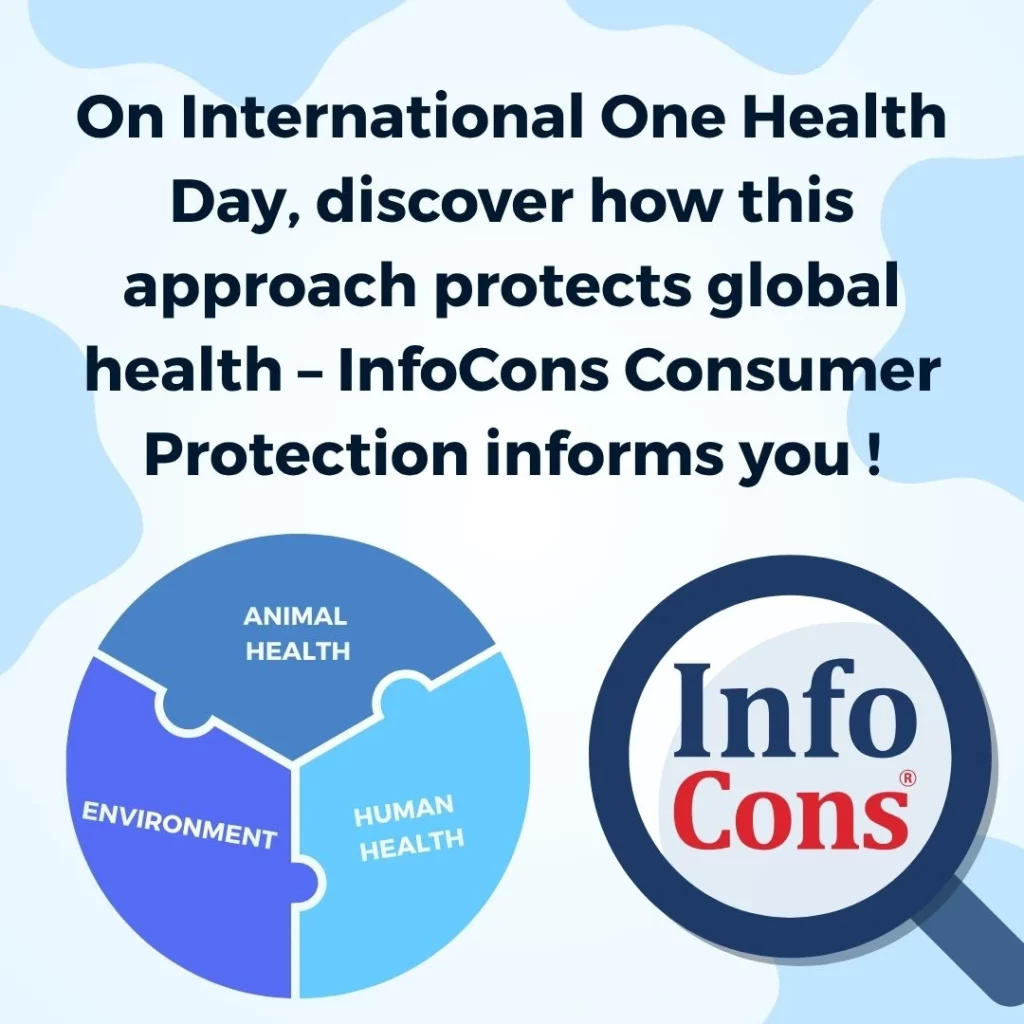
On International One Health Day , InfoCons Consumers Protection informs you about the connection between the health of people, animals, and the planet
One Health is defined by the One Health High-Level Expert Panel as an integrated and unifying approach that aims to sustainably balance and optimize the health of people, animals, and ecosystems.
It recognizes that the health of humans, domestic and wild animals, plants, and the environment (including ecosystems) are closely linked and interdependent.
In today’s interconnected world, this approach is essential to prevent, prepare for, and respond to global threats such as the COVID-19 pandemic.
Population growth and expansion have naturally led to increased contact between humans, domestic animals, and wildlife.
These developments are further reinforced by climate change, deforestation, and intensive farming, which destroy natural habitats and create new opportunities for the emergence of diseases.
InfoCons Informs You – EUIPO has developed online course modules on the essentials of Intellectual Property – Stay informed with InfoCons Consumer Protection in Intellectual Property
The movement of people, animals, and animal products — intensified by globalization — contributes to the emergence and spread of zoonoses, infectious diseases transmitted directly or indirectly between animals and humans.
There are over 200 known zoonoses, with salmonellosis and campylobacteriosis being the most reported in the EU (ECDC 2021 Zoonoses Report).
More than 60% of new and emerging infectious diseases that threaten human health originate in animal populations, and these threats are increasing in frequency and severity over time.
COVID-19 is the most recent example of a global pandemic caused by a zoonotic pathogen, alongside SARS, MERS-CoV, H5N1, H7N9, 2009 H1N1, Zika, and Ebola viruses, all capable of causing major epidemics.
In addition, many pathogens — bacteria, viruses, parasites, and fungi — are developing resistance to available treatments, posing a serious and growing global health concern.
How does the One Health approach work?
An effective One Health approach relies on cooperation and collaboration between multiple sectors and disciplines — agriculture, environment, human and veterinary medicine, epidemiology, social sciences, and governance.
Professionals and policymakers must work together at national, regional, and international levels to prevent, detect, and monitor emerging threats and to limit their spread.
This coordinated action contributes to:
- improved human, animal, and environmental health,
- better food safety and sustainability,
- and stronger preparedness for global health emergencies.
InfoCons Informs You – Everything You Need to Know About the Annual Cybersecurity Conference of the Organization for Security and Co-operation in Europe (OSCE) – Resilient Cyberspace – InfoCons Consumer Protection in Cybersecurity
What is the European Commission doing?
The European Commission applies the One Health principles across a wide range of policy areas — not only in antimicrobial resistance (AMR) and zoonoses control, but also in animal welfare, biodiversity, soil health, sustainable pesticide use, climate and health, and emergency preparedness.
Key initiatives include:
- Scientific Opinion on One Health Governance in the European Union (2024);
- The Global Health Strategy (2022);
- The European Health Emergency Preparedness and Response Authority (HERA), established in 2021;
- Regulations (EU) 2022/2371, 2022/2370, and 2022/123, addressing serious cross-border health threats, ECDC, and EMA;
- and the Farm to Fork Strategy (2020), promoting sustainable and safe food systems.
InfoCons Informs You – The Unique InfoCons Consumer Protection App – Empowering Consumers Worldwide !
InfoCons App – promoting awareness and responsibility in the spirit of One Health
Aligned with the global and European One Health vision, InfoCons empowers consumers through education, transparency, and access to reliable information.
With the InfoCons Global Consumer Protection App – One Health, available free of charge in 33 languages, users can scan products to learn about ingredients, additives, allergens, and nutritional content, set personal preferences, and receive real-time alerts on recalled or unsafe products.
Through these tools, InfoCons contributes to a more informed, responsible, and health-conscious society, reinforcing the One Health mission: one world, one health, one future.
Source : European Commission